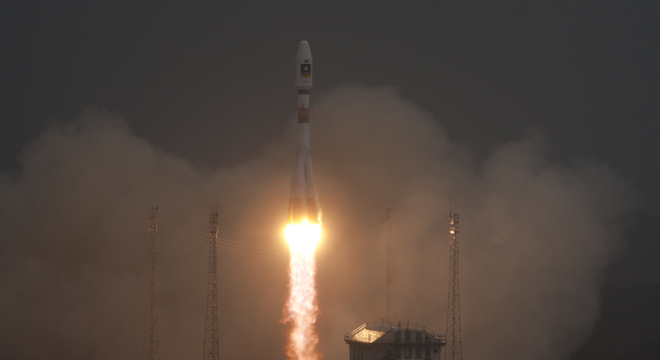The first launch of a Russian Soyuz rocket from outside of the former bases of the Soviet Union took place on Friday at the Guiana Space Center near Kourou, French Guiana at 6:30 a.m. ET.
The launch was historic for another reason: The Soyuz rocket was transporting the first two of 27 satellites of the European Space Agency’s $7.2 billion independent satellite navigational system, Galileo, which will free the continent from using American-owned Global Positioning System (GPS.)
Watch the historic takeoff here, via the AFP:
According to Laurent Wauquiez, France’s higher education minister and former deputy minister for European affairs, the Galileo system is necessary because the U.S. military could choose to shut off GPS access at any time due to an emergency. As Wauquiez told the AFP: “It means overnight we could lose our autonomy..There is an issue of sovereignty. We must not neglect this aspect even in a period of globalization.”
French aerospace company Arianespace, the first commercial satellite launching company in the world, was awarded the launch contract for the satellites and was behind the decision to use the Soyuz to get them into orbit.
“Bravo Europe…bravo Russia…bravo cooperation,” said Arianespace Chairman & CEO Jean-Yves Le Gall from the mission’s control center.
The launch had actually been delayed from its originally scheduled date of Thursday due to a technical malfunction with the rocket’s fueling system. After repairing the glitch, the rocket was good to go.
“Disappointment at technical problems that delayed the launch by a day gave way to tears of joy among the assembled officials and technicians,” Reuters reported.
According to Voice of Russia, “Equatorial launches make it possible to orbit heavy spacecraft wasting less fuel. Up to 4 satellites are planned to be launched from Kourou annually.”
Europe’s GPS alternative, which will consist of 30 satellites in total (27 active and 3 spares) is expected to come online in a preliminary mode by 2015, after 18 satellites have been launched. The complete Galileo system is expected to be operational by 2020 cost $1.6 billion per-year, according to the Telegraph.
As New Scientist reports, these satellites offer some advantages over GPS, at least on paper:
The Galileo satellites will fly farther north and south of the equator than the GPS satellites, providing better coverage at far northern and southern latitudes.
On-board are more accurate clocks than those on the current GPS satellites, which in principle could make their position data more accurate. But in practice, other sources of error are more important than clock accuracy, like the quality of the device receiving the signal and distortion of the signals as they travel through the atmosphere.
Broadly speaking, the launch represents the continued globalization of the space industry at a time when America is in the midst of reorganizing its own space priorities.
China, for instance, in late September successfully launched the first test module for its planned space station, which it hopes to have completed by 2020.
Having retired the Space Shuttle in July, NASA is investing more in commercial space partners for low-earth orbit missions to the International Space Shuttle. Meanwhile, the agency is also in the midst of prepping an expensive successor to the Shuttle, the Space Launch System, designed to take humans to an asteroid or Mars.









